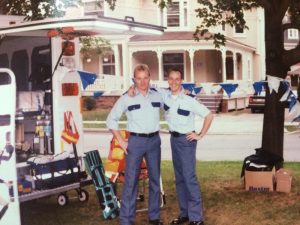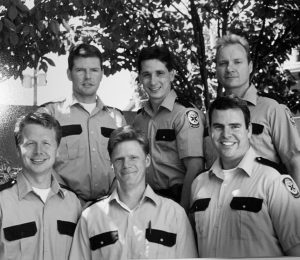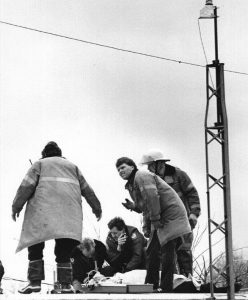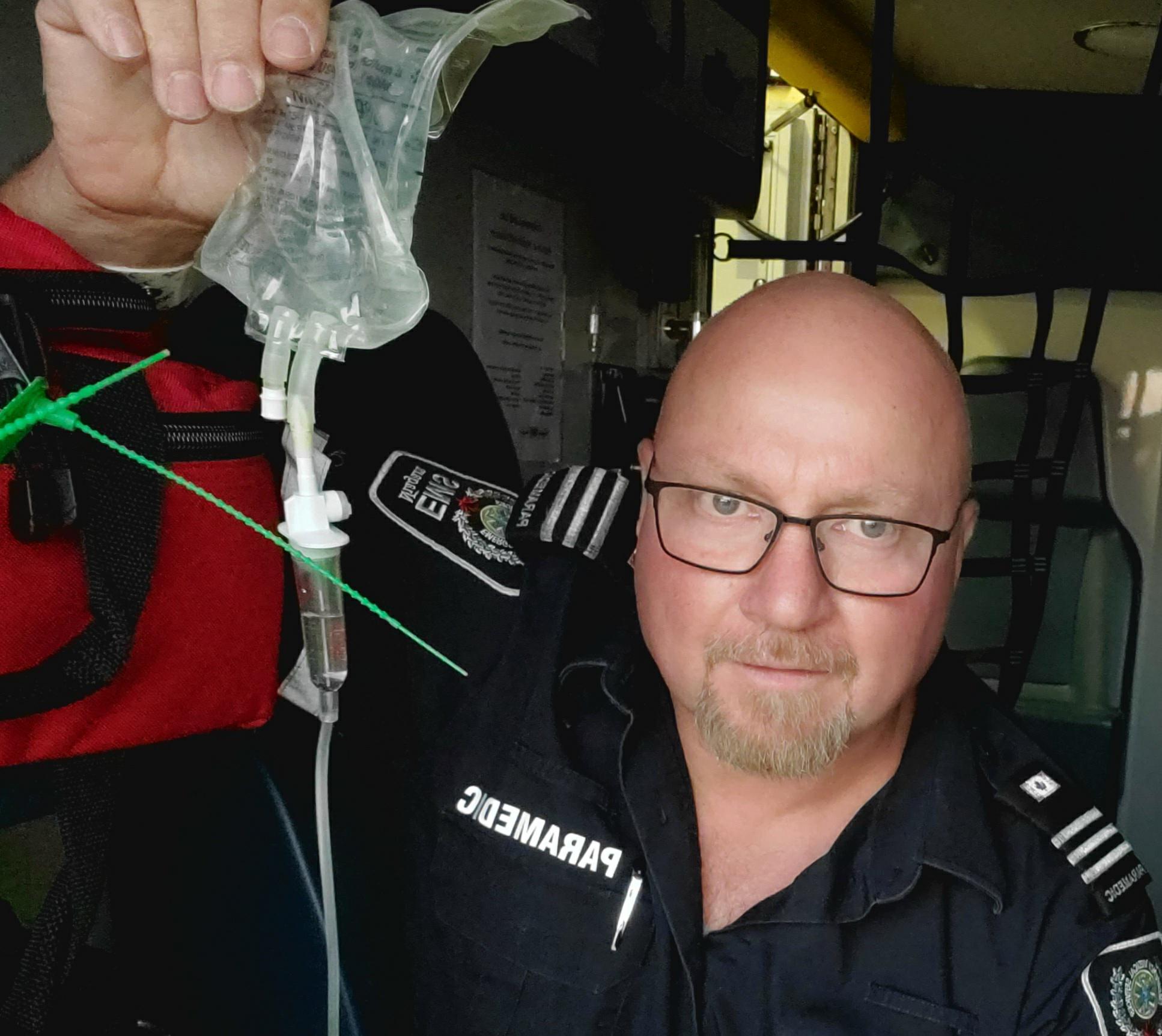Winner: Dan Kress
Nominated by: Bryce Brunarski
Congratulations to Dan Kress, our official First Responder of the Year for 2021! Dan was nominated by his former colleague at Niagara EMS, Bryce Brunarski, for his unyielding compassion, class and dignity in the field over his impressive 36 year career as an Advanced Care Paramedic.
“Although Dan is a man of stature, he is soft-spoken and truly gave all patients a sense of calm and confidence on the job with each and every call he responded to, regardless of the urgency,” Brunarski says. “He treated his patients and their families, co-workers and allied agencies with compassion and dignity, earning the respect of all he made contact with. Dan is a bigger guy as mentioned, so it was always funny among co-workers to see Dan report to work in his very small and very yellow Smart Car. He’s got a big heart and Niagara was lucky to have him serving for 36 years.”
Dan’s esteemed career began in March of 1985 with the Welland District Ambulance Service. As part of his education, Dan was assigned as a student to a crew whose responsibility was to educate and help him obtain road experience. But on one overnight shift when a fellow crew member called in sick, Dan’s student placement became an opportunity to really show his supervisor what he was made of.

Dan (left) pictured with former partner and good friend Randy Garrett. Submitted by Dan Kress.
“He handed me a crested shirt and jacket to see if they would fit and said you’re hired,” Dan recalls. “I was ecstatic. We smile when we talk about the early days but truthfully sometimes employees were hired that way. Much different than now.”
In June of that same year, Dan applied to the Hotel Dieu in St Catharine’s and worked with them as a paramedic for 15 years, until the regional amalgamation in 2000. On July 4th, 2002, the Region of Niagara took direct control and became Niagara EMS. He remained with Niagara EMS as an Advanced Care Paramedic until his retirement on November 22nd, 2021. All the while, he also managed to hold down a part-time gig providing on-site medical services for various small companies until 2005.
Early in his career, Dan remembers being filled with anxiety, admiration and nervous energy, surrounded by seasoned coworkers and feeling immense pressure to match their performance in the field.
“Of course, there is the nervousness of knowing that you are about to see things in your life and have experiences that you’ve never had before,” says Dan, “hoping that you would be able to process them and perform in a manner expected as a professional. In college we were instructed that when meeting employees for the first time you were to introduce yourself, show respect, and realize that you were at their mercy to receive guidance during this time of inexperience.”
He says taking this advice always put him in good standing and made for comfortable working relationships. “It was a matter of knowing my place,” he continues. “It’s funny when I think about how my last day on the road was similar to my first. This time I was the seasoned professional working with a very respectful excellent new paramedic. The atmosphere as we worked together was completely pleasant, showing each other mutual respect.”
Dan’s official final day on the job was spent in the traditional fashion at Niagara EMS—as with all retirees, Dan spent the day being escorted around by his supervisor to bid farewell to his coworkers and receive a proper send-off.
“It was a wonderful day which included a Zoom farewell, and then ended with dispatch saying their goodbyes and connecting me with coworkers throughout the region giving their well wishes all by radio transmission,” he says. “The last to say goodbye and wish me well was our Chief Kevin Smith in whom I have a great deal of respect.”
In 2017, Dan was one of five members of Niagara EMS who received the Governor General of Canada’s Emergency Services Exemplary Services Medal.
“The medals ceremony is a wonderful evening when you and your coworkers are celebrated,” he says. “Some receive the award because of specific achievement. Others like myself receive it because they have survived a significant amount of time exposed to risk and reward. It’s a memorable experience.”
But only three years later, the world turned upside down with the onset of the COVID-19 pandemic. Dan says it was difficult to see patients, particularly those in nursing homes and long-term care, succumbing to the virus. Although the pandemic brought its challenges, Dan says COVID was not a factor in his decision to retire. If anything, he says it further spurred his desire to continue providing care to his community.
“In one example I experienced a wife stricken, with her husband holding her hand not knowing that the next day he would be sick as well and both succumbing. It was a very sad reality,” he recalls.
Pandemic aside, after so many years of working intensive weekends and overnights, Dan decided it was time to make a change. But even after his official retirement, Dan’s passion for paramedicine hasn’t slowed down. He continues his work part-time with the City of Guelph, where he still works the road periodically. He says this arrangement allows him to continue pursuing his passion while spending more time with family and friends.
“I enjoy a new learning curve working as a community paramedic in their Community Paramedic Program which is modelled in many ways after the CP program in Niagara,” he says. “This part-time work gives me greater time to figure out what retirement will be like once I’ve given up EMS all together.”
Dan says there have been many changes to the field in the years since he first began as a paramedic in 1985. To receive his certification, Dan underwent a one-year college program, whereas today, achieving the same certification requires a two-year course as well as an additional year to become an Advanced Care Paramedic.

Members of 1997 Michener College ACP graduating class, submitted by Dan Kress. Pictured from top left: Dan Favero, Basil Riolino, Dan Kress. From bottom left: Hal Klassen, Simon Drakeford, Len Kowalic
Paramedics in 1985 did not carry advanced equipment with them on the road. Even vital signs were taken manually, and the only medication they were permitted to administer was oxygen. Today, automated technology helps emergency medical personnel provide more comprehensive and efficient care to their patients.
“I would say in the one-year program we were taught very good physiology and pathophysiology, however the care we gave was very basic,” he adds. “Your priority was to perform a very good assessment intervening if necessary, and lots of information-gathering. And then of course transferring that information to the hospital by dispatch and rapid transport if necessary.”
He continues that although the stretchers used back then were smaller and lighter than those used today, they required a full lift from the ground into the back of the ambulance. Today’s power stretchers include power loading systems, which make a paramedic’s job a lot easier. This, according to Dan, has been revolutionary.
“It used to be said that 6 years was the average length of a paramedic’s career due to back injuries,” he explains. “This is no longer the case. Medical advancements began a year after I finished college when in 1986, we began to carry cardiac monitors with defibrillators. This was the only advanced skill we performed until 1995 when we began to administer what are called symptom relief medications.”
Only a year later, the Ontario government began an advanced care training program that involved sending paramedics to Toronto for training. Paramedics like Dan became qualified to carry more medications, administer intravenous narcotics, and perform procedures considered invasive, many of which are performed in emergency departments to resuscitate and stabilize unstable patients.
In days past, paramedics were responsible for all routine transfers, even the ones involving medically stable patients. Now, these jobs are contracted out to private companies to allow paramedics to care for patients in need of more immediate medical attention. When appropriate, paramedics now have the authority to bypass closer medical facilities for hospitals that can provide more appropriate treatment such as cardio angioplasty and stenting, and the removal of blood clots at stroke centres.
Dispatch centres have also become more sophisticated over the years, according to Dan. Advancements like integrated mapping systems that automatically display the call information and mapping route on a mounted laptop in the front of the ambulance have made a paramedic’s job more efficient, allowing them to focus on the patient.
One of Dan’s most memorable days on the road happened early on in his career in 1986, the first time he ever successfully resuscitated a patient experiencing cardiac arrest. “My partner and I received the call for a man down on the roof of a building where the owner had been trying to install a TV antenna,” Dan explains. “As he was carrying the antenna, he hit a high voltage wire causing cardiac arrest.”
Thanks to Frank Adamson, who spearheaded the creation of Niagara’s first base hospital, and Doctor Doug Munkley, the hospital’s medical director, they were able to launch a cardiac monitoring and defibrillation program. This program allowed paramedics in Niagara to carry these devices in the field.
With the help of the fire department, Dan and his partner were able to get up on to the roof and begin administering CPR. Seeing that the patient was in ventricular fibrillation through the heart monitor, they were able to use the defibrillator to resuscitate his heart successfully.

Dan Kress, partner Craig Slack and other First Responders resuscitate their first cardiac arrest patient on the road, 1986. Submitted by Dan Kress.
“Unbeknownst to us a journalist had followed us up on the ladder and was there to take a photo,” he says. “It was memorable because this program was brand new, and we just happened to be the crew that got the call that gave it a good public relations boost. I’m glad for the memory of that call during the transition we underwent at that time in Niagara which was the beginning of many good things to come.”
Over the years, Dan says many innovations such as cardiac defibrillation struggled to gain traction in Ontario, despite being successfully implemented elsewhere. He says that was a major source of frustration in the profession, but he remains thankful to the pioneers who took the lead and pushed to overcome roadblocks, putting their jobs on the line fighting bureaucratic resistance.
“It’s because of them that we have the profession that we have today,” he says. “To all those individuals like Frank and Doug–you know who you are–we thank you.”
To finish things off, we asked Dan what advice he would give to new paramedics starting out today if he could offer one piece of advice. He says the most important thing to remember is kindness, and doing your part to create a workplace environment that people are excited to be a part of, even when things get tough.
“As time goes on, treat your patients and your co-workers like you do right now,” he says. “Have fun at work. Try to lift the spirits of those around you. Be assertive that way. Care about each other.”
Thank you for all that you do, Dan, and congratulations from all of us at The Shield Journal!
***
Every year, The Shield Journal selects one to three First Responders of the Year, nominated by our readers and community partners. Our First Responders of the Year are recognized on our website and social media channels; they also receive a one-page feature in our digital magazine and a certificate in recognition of the achievement.
To nominate a First Responder in your community, reach out to us via email at submissions@theshieldjournal.ca or by private messaging us on Twitter, Instagram or Facebook with the name of your nominee and your reason for nominating them. We look forward to receiving your submissions!


